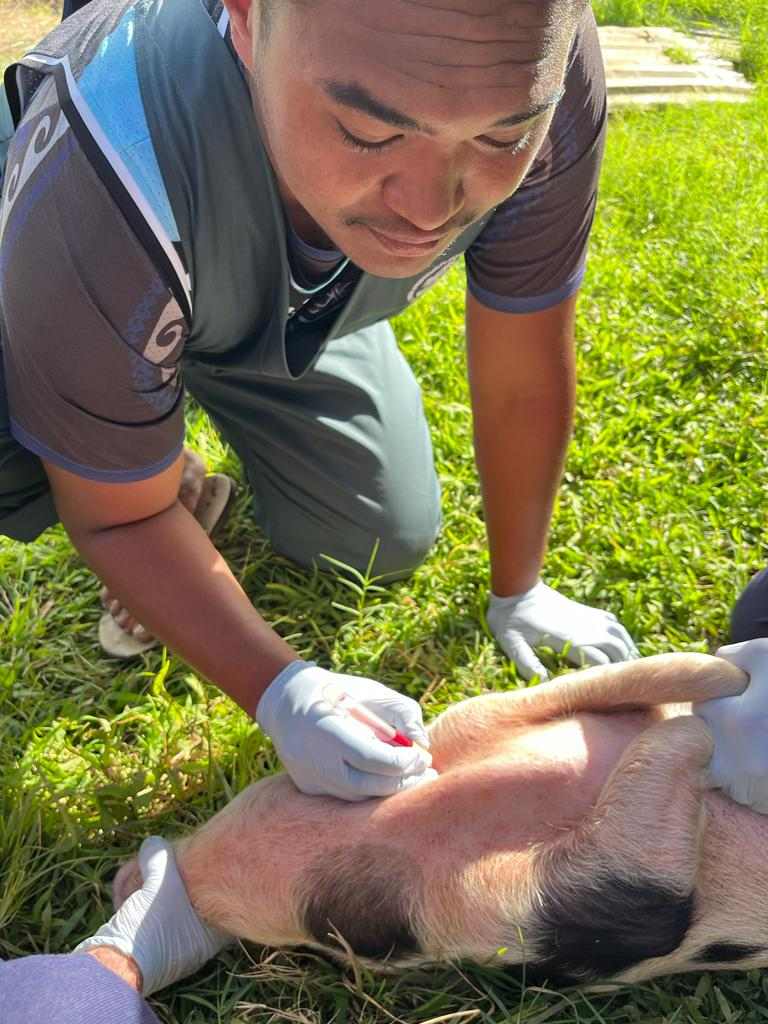Agriculture staff in para-veterinary class
Wednesday 13 September 2023 | Written by Supplied | Published in Economy, Environment, National

Six Ministry of Agriculture biosecurity and livestock staff have been busy attending a veterinary summer class. SPC / 23080932
Six Ministry of Agriculture biosecurity and livestock staff have been attending a veterinary summer class, and at the end of the year, the successful participants will receive certification from SPC and the Ministry of Agriculture.
According to the Pacific Community –SPC, the Cook Islands Para-veterinary Summer School started this month with the biosecurity and livestock officers completing their final assessments for the 10-week training program.
SPC says the training is a flagship programme of SPC and Land Resources Division (LRD) working in collaboration with the Ministry of Agriculture and New Zealand’s Ministry for Primary Industries (MPI) who are on the ground facilitating with support from observers, the Australian Department of Agriculture, Fisheries and Forestry.
Ministry for Agricutlure secretary, Temarama Anguna-Kamana, said that the Ministry had faced a situation where it had not had a veterinarian on its staff for a considerable amount of time.
According to SPC; while they have been fortunate to use a veterinarian associated with the Te Are Manu Veterinary Clinic, this arrangement is not a sustainable long-term solution.
“Having our staff complete this para-vet training allows us to maintain these skills in-country on how to treat animals with health problems and diagnose animal diseases. Whilst this is not a full Veterinary qualification, this is a first step in this field and assures our livestock owners that we at the Ministry of Agriculture can provide the services and advice needed to care for their livestock,” she said.
"It also reinforces our position when we communicate to livestock owners and the community about the significance of proper livestock management, maintaining meat hygiene standards, and responsible waste disposal. We explain why quarantine measures are essential to prevent the introduction of exotic animal diseases into our country."
She acknowledged the opportunity provided to the Cook Islands by their partners on this project and look forward to the certification of the ministry’s staff as qualified para-veterinarians.
The training is funded by the European Union in the Pacific through the SAFE Pacific project.
Biosecurity New Zealand’s Programme Manager of Animal Health and Biosecurity Pacific Partnership, Dr Andrew McFadden said: “Walking alongside this great group of people and seeing them develop skills, knowledge, and confidence has been awesome for myself and the New Zealand programme team, and we are so proud of the Cook Island Ministry of Agriculture team”.
Participants learn ways to improve animal management, how to treat animals with health problems, the importance of meat hygiene and waste disposal, how to diagnose animal diseases, the importance of quarantine and the prevention of exotic diseases from entering the country.
“We are proud to witness the Cook Islands' commitment to this vital training programme and the unwavering dedication of its students to successfully complete their training,” said SPC Pacific Head of Veterinary and Animal Production Services (PHOVAPS) Coordinator Elenoa Salele.
“This effort is important for the Cook Islands and our region in meeting the growing demand for additional para-veterinarians in the field. The training responds to one of the key priorities identified in the recently endorsed Pacific Animal Health and Production Capacity Building Plan (PCBP) on the lack of access to veterinarians in the region.”
The training is a flagship programme developed by SPC. Since its inception in 2013, it has been implemented in 15 Pacific countries. The full training course was designed as a distance-learning programme and focused on animal health and production issues for livestock found in the region, including cattle, goats, sheep, pigs, horses, and poultry.
In addition to the Cook Islands, the para-vet training was launched in Fiji and Nauru.
Release / LL










































